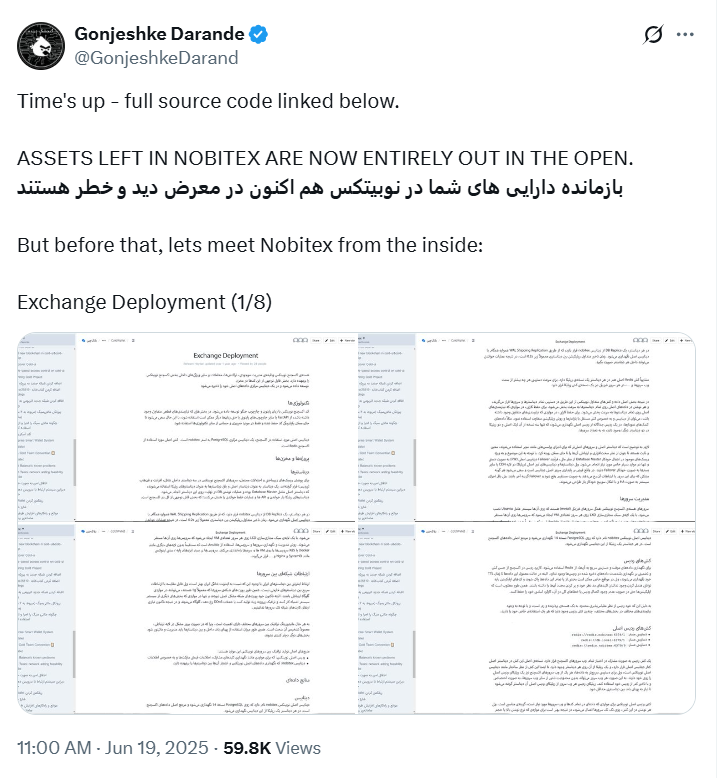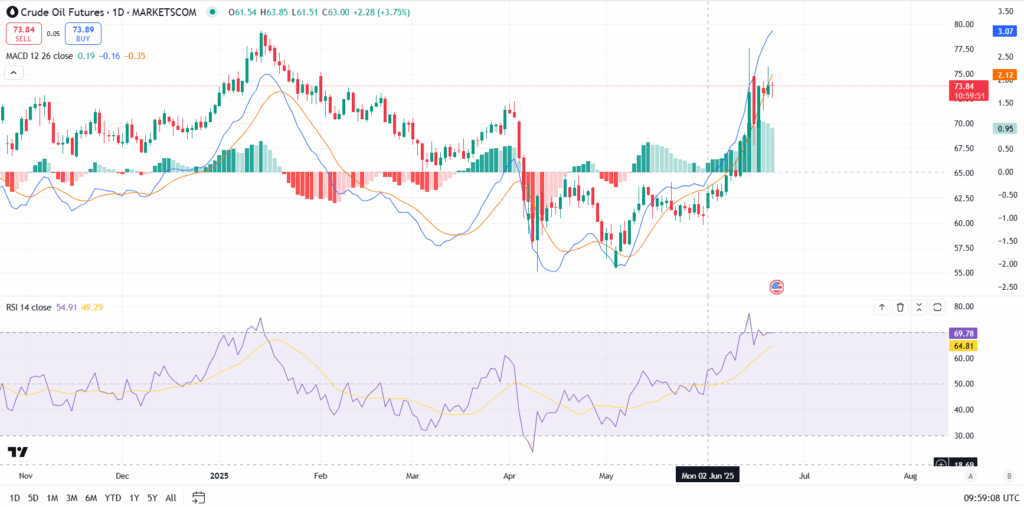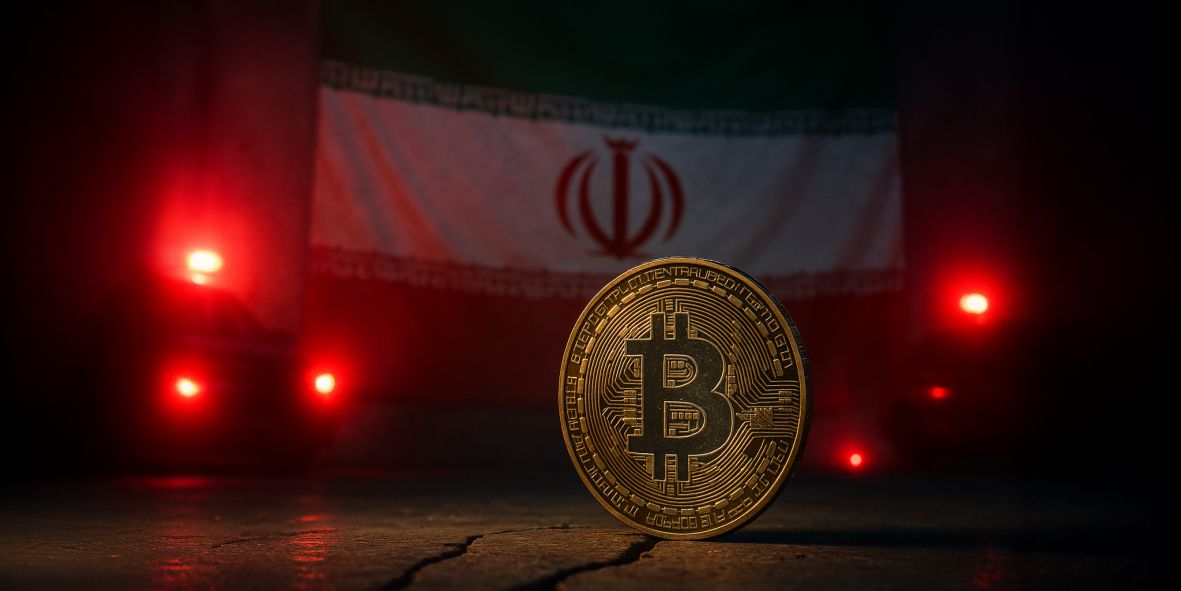Key Takeaways:
- Crypto Breach Hits Nobitex: Around $82M drained in a politically motivated hack tied to the Israel–Iran war.
- Iran Imposes Crypto Curfew: The government restricted exchange hours to improve oversight and limit cyber risk.
- Source Code Leaked: Hackers released Nobitex’s internal infrastructure, exposing core operations to the public.
- Bank Sepah Taken Offline: State-owned bank’s data reportedly destroyed in a separate targeted cyberattack.
- Market Shockwaves: Oil and gold spiked, while crypto and equities fluctuated amid escalating regional conflict.
Iran-based cryptocurrency exchange Nobitex was hit by a major cyberattack on June 18, resulting in the theft of at least $82 million in digital assets. The breach prompted Tehran to impose an operating curfew on all domestic crypto platforms and led to the public leak of the exchange’s internal source code by the hacker group responsible.
On June 18, blockchain investigator ZachXBT flagged suspicious outflows totaling $81.7 million from Nobitex’s hot wallets, spanning Tron, Doge, Bitcoin, and EVM chains.
The initial $49 million was transferred using a vanity address labeled “TKFu….oristsNoBiTEXy2r7mNX,” followed by a second withdrawal to the address “0xffFFfFF…Dead.”
A pro-Israel hacktivist group known as “Gonjeshke Darande,” or “Predatory Sparrow,” claimed responsibility for the breach, accusing Nobitex of facilitating Iran’s evasion of Western sanctions among other illegal activities, and threatening to release the exchange’s full source code within 24 hours.
Nobitex’s technical team detected unauthorized access early on June 19, subsequently suspending operations and taking the platform offline.
The exchange emphasized that user assets held in cold storage were unaffected, hot-wallet losses were limited, and that all affected users would be fully reimbursed through its insurance reserves.

Government-Imposed Curfew on Crypto Firms
In response to the incident, the Central Bank of Iran imposed new operating restrictions on domestic cryptocurrency exchanges, limiting their activity to the hours between 10 a.m. and 8 p.m. local time.
According to Chainalysis, the curfew is intended to enhance oversight, reduce systemic risk during non-operational hours, and prevent further breaches.
The Fallout Continues: Nobitex Source Code Leaked
The Nobitex hack appears to be more than a financially motivated cybercrime. With funds directed to burn addresses and the use of politically charged vanity addresses, the attack is widely interpreted as a politically driven act.
Furthermore, to ensure the complete disruption of the exchange’s operations, the hacker group followed through on its threat by releasing Nobitex’s full internal source code. Published across X (formerly Twitter) and a Telegram channel.
The leaks included backend infrastructure files, cold wallet scripts, server configurations, and user guides, exposing the full technical blueprint of one of Iran’s most prominent crypto platforms.

Cyberwarfare Becomes a New Front in the Israel–Iran Conflict
The Nobitex hack is not an isolated incident but a clear extension of the ongoing conflict between Israel and Iran, marking one of the most significant cyberattacks on Iran’s financial infrastructure to date.
Just one day earlier, on June 17, the same hacker group, Gonjeshke Darande (Predatory Sparrow), claimed responsibility for another major breach, this time targeting Iran’s state-owned Bank Sepah.
According to a Reuters report, the group accused the bank of funding Iran’s military and declared that it had “destroyed data,” leading to widespread service disruptions.
The cyberattacks followed Iran’s large-scale retaliation against Israeli airstrikes targeting its military and nuclear facilities, intensifying an already volatile regional standoff.
Markets Are Caught Up in the Chaos of Cyber and Military Conflict
The Israel–Iran conflict, now extending into cyberwarfare with coordinated strikes on Bank Sepah and Nobitex, has sent shockwaves through global markets.
Oil prices surged nearly 20% in June amid fears of supply disruptions, with analysts warning of potential spikes to $90–130 per barrel if the Strait of Hormuz is compromised.

Additionally, gold climbed above $3,400/oz as investors sought safe havens, while Bitcoin fluctuated between $103K and $106K, behaving more like a risk asset than a hedge.
Equities, meanwhile, traded erratically, swinging in response to global governments’ positions on the conflict. Any indication of direct involvement has prompted investors to retreat from risk and shift capital into traditional safe-haven assets.
Read More: 16 Billion Passwords Leaked: Why Crypto Users Should Panic (and What to Do)







